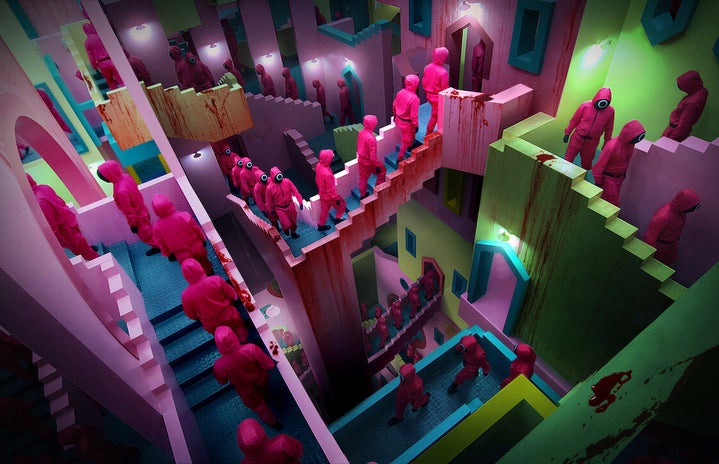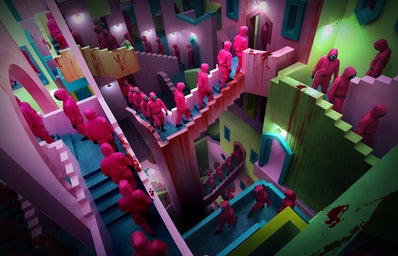The new TV show Squid Game has been an international sensation since it was released in September of this year. Its harrowing and gory scenes featuring funny characters makes it undeniably entertaining. But, the show’s underlying social commentary about wealth, capitalism and social mobility makes it cerebral and captivating in a way that resonates with everyone — from working class people in Korea to teenagers in the US.
Themes surrounding capitalism are obviously central to the series as a whole. Hwang Dong-hyuk, the creator of the show stated, “I wanted to write a story that was an allegory or fable about modern capitalist society, something that depicts an extreme competition, somewhat like the extreme competition of life.”
He definitely depicts an extreme competition. Being gunned down at the hands of a giant, fake doll while playing a school-yard game called ‘Red Light, Green Light’ seems pretty extreme to me. The connection between these extreme games in the show to the “extreme competition of life” isn’t always blatantly obvious, but when you dig in and see the meticulous symbolism, it really is an amazing social commentary. In case you missed a few of Dong-hyuk’s connections that help build the bigger message of Squid Game, here are some of my thoughts (as best as I can describe through the lens of my Western perspective.)
1) Ttakji (the folded paper flip game)
From the beginning of the series, it’s clear that Seong Gi-Hun, the main character, is bogged down by poverty and desperation. He has already been stomped on by the vices of capitalism, he is poor and forgotten about and he has little hope of pulling himself out of debt. So, he tries to gamble. First on horse-races (which turns out to be unsuccessful,) and then in a game of Ttakji with a suited-man who ends up giving him the opportunity of a lifetime — a chance at becoming rich.
What does this game of Ttakji have to do with capitalism? Well, most obviously, the end game is money. Money is what motivates Gi-Hun. It is what the suited-man promises. It is the end goal, no matter what horrible things may come along with it.
Promise of money → doing anything and everything to get it. Most people would say this is the basis of capitalism.
Secondly, while playing the game, the suited man says he will give Gi-Hun money when he wins, but when he loses, Gi-Hun must give him the same amount back. But when Gi-Hun loses and has no money to give, the suited-man says that it’s okay and he will just slap him in the face instead. Slap him in the face. When applying the more metaphorical sense of “a slap in the face” to this situation, I would say it is pretty on-the-nose when tied back to modern capitalism.
You don’t have money → the powerful will just belittle you and abuse your desperation (an enduring theme throughout the entire series.)
2) Justifying murder and betrayal
Obviously, after the first yard-game, ‘Red Light, Green Light,’ the viewers and the players find out that the players will be shot and killed when they lose a game. This is horrifying to everyone at first, but the players (and the viewers) quickly get over it because it’s just the way things work.
My best friend just got shot in front of me while playing a children’s game? Alright, no big deal. I’m still alive and I still have the chance of winning the money.
In my opinion, this is one of the most important symbols in the whole show. How far are people willing to go? Well, apparently they are willing to go pretty far, because even brutal murder is not enough to deter the players from the goal of becoming rich. Tying it back to the creator’s bigger message: how far are people willing to go in our own society to make money? In his opinion, they are willing to do pretty much anything. While he is not literally suggesting that everyone is going around mercilessly killing people, he is saying that people’s individual success within a capitalistic society comes above all else. Even the welfare of other people- friends, neighbors, enemies, strangers- cannot beat this priority.
For example, when Cho Sang-Woo, the intelligent lawyer, betrayed his friend and ally, Ali, during the marbles game, he sentenced Ali to death. Many viewers were heartbroken and angry at Sang-Woo — how could he ever kill his friend like that? You may have justified his betrayal or you may have refused to ever forgive him, but either way the creator of the show forced you to think about and form an opinion about how far is too far. Was he justified because his own life was on the line? Or was he in the wrong because you shouldn’t value any one life over another and because it’s wrong to kill people for your own benefit (especially people as sweet as Ali?)
In my opinion, forcing you to challenge your beliefs about how far is too far is pretty much the entire point of the show.
3) The wealthy sit and watch while the poor fight for their lives
A whole new layer was revealed towards the end of the series when the VIPs (wealthy, white, bored Americans) came to spectate during the bridge game. They sat behind glass and gambled on winners (much like horse-racing and The Hunger Games) in a way that was clearly dehumanizing the players. The poor players were viewed as “game pieces” to be manipulated by the wealthy men, and their lives had no value. The VIPs revealed that this was entertainment for them because their money-filled lives had turned vapid and boring (another commentary on capitalism and wealth.)
This is a huge social commentary on the relationship between the rich and the poor in our own society. The wealthy don’t treat the poor like they have any value: it is as simple as that. Why there is not an understanding of humanity between the wealthy and the poor is troubling and complex, but money is clearly the divider. Those with money, and therefore power, believe they are above those without it, and treat them as such. This is a vicious cycle leaving poor people with little no chance of fighting their way out of poverty when the wealthy are doing everything they can to hold on to their own status as “superior.”
4) Are humans inherently good or evil?
Touching on the biggest twist of the whole season, the Old Man, Oh Il-Nam, is revealed as the mastermind of this entire game — which is absolutely heart-breaking and brilliant at the same time. When talking to Gi-Hun about his motives behind creating the game, the Old Man points out a homeless man sitting out to die in the cold weather and he tells Gi-Hun that if someone stops to help the man, then Gi-Hun wins and humans are ultimately good. If not, then the Old Man is justified in his opinion that humans are inherently horrible people, and he’s no worse than the average man. In the end, someone helps the man and ends the show on a semi-good note, proving that there is hope for humanity.
Humans are good, however, our society- including capitalism- leads them to do bad things. Basically, we have the chance to lead more humane lives if we each do our part to fight against the corrupt nature of our society and if we change the way things are being done.
5) Money can’t and won’t buy happiness
While Gi-Hun wins the game, and thus the money, it is so clear that it makes him absolutely miserable. He is so troubled that he doesn’t even spend a cent of the money, and instead goes on living his life in poverty. He realizes that all of the horrible things that he did cannot be justified: all of the deaths that he witnessed and caused were not worth the money he got as a reward.
In conclusion, money doesn’t buy happiness! So why are we chasing after it in our own real-life society like it will?
There’s so much to unpack within Squid Game. Hwang Dong-hyuk builds a world that is so enthralling and complex that I couldn’t possibly dissect every bit of it. But overall, Squid Game raises some really important questions and commentaries about capitalism and the horrors of our modern world.
Art can be a powerful social commentary and quite possibly the easiest (and most enjoyable) way for all of us laymen to really delve into the social problems that plague our society as a whole. Squid Game definitely proves it.

